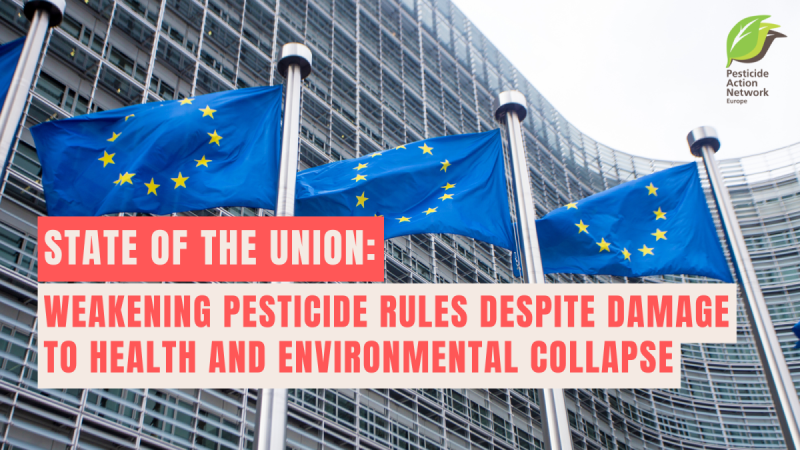In the ‘State of the Union’ to the Parliament, EU President Von der Leyen preaches deregulation to please the industry. The EU should take care of European's health instead of backtracking on environmental protections to place corporate profits above the rights of people and nature. Politicians should better address the ecological collapse and the contamination of water bodies with TFA, the most abundant PFAS 'forever chemical' in the environment. Ahead of the State of the Union address, PAN Europe joins 500 other organisations to denounce the weakening of environmental and social safeguards by the EU and recalls that our rights, nature and health are not for sale.
The Commission’s so-called "unprecedented simplification effort" is, in reality, a push for deregulation. In a strong statement, NGOs and trade unions from all over Europe call for social rights and better protection in the face of the problems people face and the environmental disaster we’re experiencing. [1] Talking about health, biodiversity and food production, we need a more effective implementation of existing laws and, where needed, more protective regulation, not a weakening of the rules.
Alarming decline of bees and other arthropods
Bees and bugs are facing a silent but massive extinction, driven by industrial farming and increasing pesticide use, with flying biomass falling by up to 75% in less than thirty years in Europe. Arthropods pollinate crops, enrich soils, and sustain biodiversity—services essential to our survival.
Yet industry-influenced EU guidelines still allow pesticides that can kill half of non-target arthropods in a single spraying, under the false assumption that populations recover easily. But science shows the opposite: pesticides are a key driver of insect decline. The Commission and EFSA should put an end to these outdated and harmful rules and ensure that biodiversity takes precedence over industry in the new guidance documents they are drafting. [2]
Water contamination crisis
Is President von der Leyen truly concerned about the new threats to our 'planetary boundaries' that scientists warn about? Apparently not. The Commission continues to authorise PFAS “forever chemical” pesticides, which degrade into TFA—a small PFAS substance linked to developmental toxicity and suspected of harming reproduction. TFA levels are steadily rising and have already been detected in tap water, groundwater, and even bottled mineral water. This could become Europe’s most widespread contamination crisis.
Instead of addressing the main cause—pesticides—the Commission’s Water Resilience Strategy leans on costly clean-up systems. Meanwhile, the EU is addressing an unsustainable farming model. Farmers have been legally required since 2014 to adopt the least harmful practices, but the Common Agriculture Policy (CAP) only supports the sustainable pesticide use on a small fraction of farmland. And the Commission seems to have forgotten its commitment to cut pesticide use in half by 2030. [3]
In addition, there are worrying indications that the proposed comprehensive ban on ‘'forever chemicals' (PFAS) will be weakened.
Invisible chemical war in third countries
Although the EU is not officially at war, the export of banned substances in Europe takes lives in third countries. Pesticides too dangerous to be used within the Union are still legally exported abroad, causing severe health and environmental damage where they are applied. Their residues return to Europe through imported products, while also placing EU farmers in a situation of unfair competition. In 2020, the European Commission committed to ending this practice—yet we are still waiting. [4]
Our brains and hormones are threatened by invisible enemies
Despite clear scientific evidence showing that certain substances are harmful to health and the environment, many remain in use in the EU. On top of that, 32 PFAS pesticides are currently approved for use. Research indicates that some pesticides negatively affect the brains of children and may contribute to diseases such as Parkinson’s. Yet substances like deltamethrin, difenoconazole, acetamiprid, and glyphosate, which have been shown to be neurotoxic, are still authorised. [5]
It is therefore incomprehensible that pesticides are rarely tested for their long-term effects on the brain and nervous system before authorisation. Even when a substance is identified as dangerous, it can still remain in use for a long time. This is the case of flufenacet, which EFSA concluded is an endocrine disruptor affecting thyroid function and potentially causing irreversible neurological damage in the unborn. After many years of discussion and continued use, it will finally be banned. However, the official EU decision allows the spraying of this herbicide for up to 18 more months, which goes against EU legislation. [6]
But the good news is that pesticides are not needed to feed the world, as already scientifically established. [7] Organic production allows us to produce healthy food, while protecting the environment. A 2018 French study found that consuming mostly organic food reduces the overall risk of developing cancer by 25%, particularly post-menopause breast cancer (-34%) and lymphomas (-76%), and non-Hodgkin lymphomas, eliminating other risk factors such as lifestyle. [8]
Pesticide-intensive agriculture only survives thanks to massive public subsidies (CAP, water decontamination, public social security covering harms to health, etc.). The 'pesticides system' is allowed because of complacent public servants and politicians who believe the lies and myths of the agrochemicals' industry. We cannot simply accept the threats to our health and biodiversity. Deregulation is the problem, not the solution.
Notes:
[1] Statement: The EU weakens the rules that safeguard people and the environment
[2] Restore biodiversity - protect bees and bugs
[3] European Water Resilience Strategy: sinking ambitions on pesticide pollution
[5] Save our brain
[7] European Chemical Pesticide-Free Agriculture in 2050
[8] Association of Frequency of Organic Food Consumption With Cancer Risk
